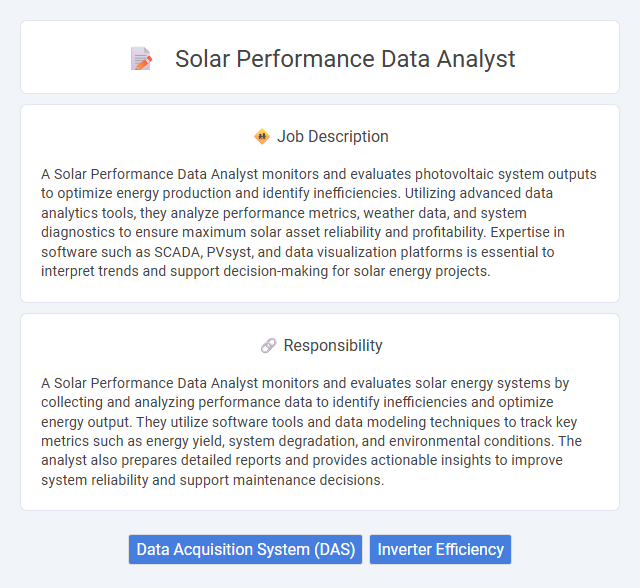
A Solar Performance Data Analyst monitors and evaluates photovoltaic system outputs to optimize energy production and identify inefficiencies. Utilizing advanced data analytics tools, they analyze performance metrics, weather data, and system diagnostics to ensure maximum solar asset reliability and profitability. Expertise in software such as SCADA, PVsyst, and data visualization platforms is essential to interpret trends and support decision-making for solar energy projects.
Individuals with strong analytical skills and a keen interest in renewable energy are likely to be well-suited for a Solar Performance Data Analyst role. Those who enjoy working with large datasets, identifying performance trends, and optimizing system efficiency might find this position rewarding and engaging. People who prefer routine tasks or lack proficiency in data interpretation may face challenges adapting to the dynamic and problem-solving nature of this job.
Qualification
A Solar Performance Data Analyst must possess strong analytical skills with expertise in data modeling, statistical analysis, and solar energy systems. Proficiency in software tools such as Python, SQL, and SCADA systems is essential for monitoring and optimizing photovoltaic plant performance. A background in renewable energy engineering, data science, or a related STEM field, combined with experience in performance benchmarking and failure analysis, enhances job effectiveness.
Responsibility
A Solar Performance Data Analyst monitors and evaluates solar energy systems by collecting and analyzing performance data to identify inefficiencies and optimize energy output. They utilize software tools and data modeling techniques to track key metrics such as energy yield, system degradation, and environmental conditions. The analyst also prepares detailed reports and provides actionable insights to improve system reliability and support maintenance decisions.
Benefit
A Solar Performance Data Analyst likely enhances energy efficiency by identifying patterns and anomalies in solar power production data, which may lead to optimized system performance and reduced operational costs. They probably help forecast energy output and predict maintenance needs, potentially increasing the reliability and lifespan of solar installations. Their insights might support sustainable energy goals, offering significant environmental and financial benefits for organizations investing in solar technology.
Challenge
A Solar Performance Data Analyst likely faces the challenge of interpreting complex datasets generated from solar energy systems to identify inefficiencies and predict maintenance needs. The role probably requires a deep understanding of both data analytics and solar technology to ensure optimal energy production. Managing the variability of solar performance influenced by weather conditions and equipment anomalies may also present ongoing analytical difficulties.
Career Advancement
A Solar Performance Data Analyst leverages advanced data analytics to optimize renewable energy outputs and enhance solar panel efficiency. Mastery in machine learning algorithms, photovoltaic technology, and energy systems modeling propels career growth toward senior analyst roles and project management positions. Pursuing certifications in data science, renewable energy, and cloud computing significantly boosts upward mobility within the solar energy sector.
Key Terms
Data Acquisition System (DAS)
A Solar Performance Data Analyst specializing in Data Acquisition Systems (DAS) is responsible for collecting, monitoring, and analyzing real-time solar energy production data to optimize photovoltaic system efficiency. They ensure the integrity and accuracy of data captured from inverters, weather stations, and sensors, enabling precise performance assessment and fault detection. Proficiency in handling large datasets and interpreting DAS outputs supports predictive maintenance and enhances overall solar plant productivity.
Inverter Efficiency
Solar performance data analysts specializing in inverter efficiency evaluate the conversion rates of solar inverters to maximize energy output and system reliability. They analyze real-time and historical data from inverter performance metrics, identifying patterns and anomalies that impact overall plant efficiency. Utilizing advanced analytical tools, these analysts optimize inverter settings and recommend maintenance schedules to enhance energy yield and reduce downtime.
 kuljobs.com
kuljobs.com